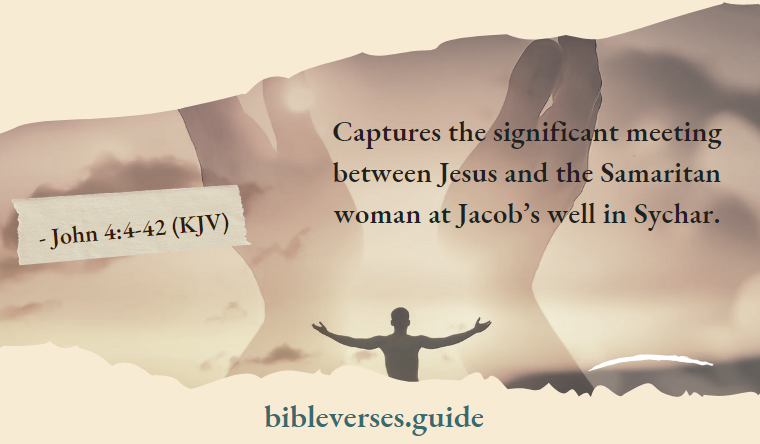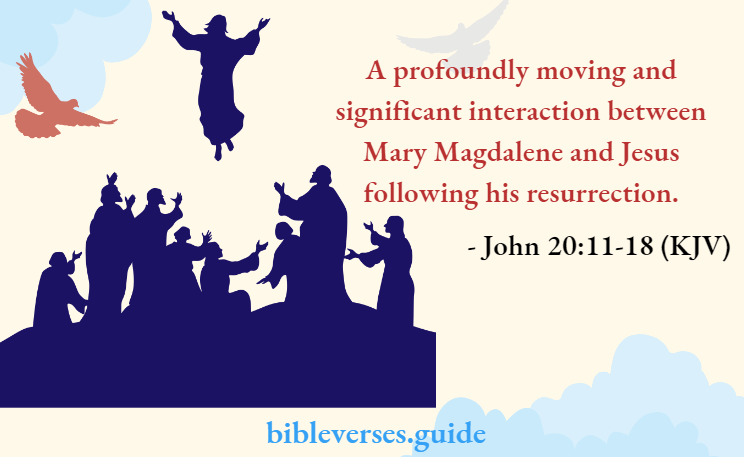“4 And he must need to go through Samaria.
5 Then cometh he to a city of Samaria, which is called Sychar, near to the parcel of ground that Jacob gave to his son Joseph.
6 Now Jacob’s well was there. Jesus therefore, being wearied with his journey, sat thus on the well: and it was about the sixth hour.
7 There cometh a woman of Samaria to draw water: Jesus saith unto her, Give me to drink.
8 (For his disciples were gone away unto the city to buy meat.)
9 Then saith the woman of Samaria unto him, How is it that thou, being a Jew, askest drink of me, which am a woman of Samaria? for the Jews have no dealings with the Samaritans.
10 Jesus answered and said unto her If thou knewest the gift of God, and who it is that saith to thee, Give me to drink; thou wouldst have asked of him, and he would have given thee living water.
11 The woman saith unto him, Sir, thou hast nothing to draw with, and the well is deep: from whence then hast thou that living water?
12 Art thou greater than our father Jacob, which gave us the well, and drank thereof himself, and his children, and his cattle?
Read and Learn More Empowering Bible Verses For Women
13 Jesus answered and said unto her, Whosoever drinketh of this water shall thirst again:
14 But whosoever drinketh of the water that I shall give him shall never thirst; but the water that I shall give him shall be in him a well of water springing up into everlasting life.
15 The woman saith unto him, Sir, give me this water, that I thirst not, neither come hither to draw.
16 Jesus saith unto her, Go, call thy husband, and come hither.
17 The woman answered and said, I have no husband. Jesus said unto her, Thou hast well said, I have no husband:
18 For thou hast had five husbands, and he whom thou now hast is not thy husband: in that saidst thou truly.
19 The woman saith unto him, Sir, I perceive that thou art a prophet.
20 Our fathers worshipped in this mountain; and ye say, that in Jerusalem is the place where men ought to worship.
21 Jesus saith unto her, Woman, believe me, the hour cometh, when ye shall neither in this mountain, nor yet at Jerusalem, worship the Father.
22 Ye worship ye know not what: we know what we worship: for salvation is of the Jews.
23 But the hour cometh, and now is, when the true worshippers shall worship the Father in spirit and in truth: for the Father seeketh such to worship him.
24 God is a Spirit: and they that worship him must worship him in spirit and in truth.
25 The woman saith unto him, I know that Messias cometh, which is called Christ: when he is come, he will tell us all things.
26 Jesus saith unto her, I that speak unto thee am he.
27 And upon this came to his disciples, and marveled that he talked with the woman: yet no man said, What seekest thou? or, Why talkest thou with her?
28 The woman then left her waterpot, and went her way into the city, and saith to the men,
29 Come, see a man, which told me all things that ever I did: is not this the Christ?
30 Then they went out of the city and came unto him.
31 In the mean his disciples prayed to him, saying, Master, eat.
32 But he said unto them, I have meat to eat that ye know not of.
33 Therefore said the disciples one to another, Hath any man brought him ought to eat?
34 Jesus saith unto them, My meat is to do the will of him that sent me and to finish his work.
35 Say not ye, There are yet four months, and then cometh harvest? behold, I say unto you, Lift up your eyes, and look on the fields; for they are white already to harvest.
36 And he that reapeth receiveth wages, and gathereth fruit unto life eternal: that both he that soweth and he that reapeth may rejoice together.
37 And herein is that saying true, One soweth, and another reapeth.
38 I sent you to reap that whereon ye bestowed no labor: other men labored, and ye are entered into their labors.
39 And many of the Samaritans of that city believed in him for the saying of the woman, which testified, He told me all that ever I did.
40 So when the Samaritans came unto him, they besought him that he would tarry with them: and he abode there two days.
41 And many more believed because of his own word;
42 And said unto the woman, Now we believe, not because of thy saying: for we have heard him ourselves, and know that this is indeed the Christ, the Saviour of the world.”
John 4:4-42 (KJV)

Here’s a breakdown of the passage:
Jesus’ Journey And Rest (Verses 4-6): Jesus traveled from Judea to Galilee, passing through Samaria. This was unusual due to the historical animosity between Jews and Samaritans. Weary from his journey, Jesus rests at Jacob’s well.
Conversation With The Samaritan Woman (Verses 7-26): The Samaritan woman arrives to draw water, and Jesus initiates a conversation by asking for a drink, breaking cultural barriers. Jesus shifts the dialogue to spiritual matters, discussing “living water,” symbolizing eternal spiritual fulfillment.
Despite initial confusion, the woman is intrigued as Jesus reveals knowledge about her life, leading her to recognize him as a prophet. They discuss worship, the Messiah, and Jesus reveals himself as the awaited Messiah.
The Disciples’ Return and Further Dialogue (Verses 27-38): The disciples return and find Jesus conversing with the Samaritan woman but do not question him. The woman, touched by the encounter, leaves to share the news in the town. Jesus speaks to his disciples about spiritual harvest, paralleling the Samaritans’ belief to ripe fields ready for gathering.
Response of the Samaritans (Verses 39-42): Samaritans, influenced by the woman’s testimony, seek Jesus. They invite Jesus to stay, leading to more Samaritans believing in him over two days. Their faith is not only based on the woman’s account but also on Jesus’ teachings.
This Passage Is Significant For Various Reasons:
- Illustrates Jesus’ outreach to societal outsiders and the marginalized.
- Showcases the Samaritan woman as an evangelist, spreading her encounter to lead others to faith.
- Reveals Jesus’ use of everyday experiences to teach spiritual truths.
- Emphasizes the universal nature of the Gospel, transcending cultural and gender boundaries.
- Highlights the importance of personal testimony in guiding others to faith in Jesus.
Points To Ponder:
Acknowledgment And Respect: Jesus sets an example by engaging in a meaningful conversation with the Samaritan woman, acknowledging her presence and treating her with dignity despite societal barriers.
This recognition of her value affirms our worth and dignity in God’s eyes. Participation in Ministry: Jesus involves the Samaritan woman in his ministry by revealing himself as the Messiah, recognizing her spiritual needs with the offer of living water, symbolizing eternal life.
This involvement highlights our role as active contributors to God’s work, regardless of our backgrounds.
Authority To Share: The Samaritan woman becomes an evangelist after encountering Jesus, spreading the message of Christ, and leading many to believe in him. This empowerment to share the Gospel emphasizes our significant role in proclaiming salvation, encouraging us to boldly express our faith and guide others to Christ.
Challenging Social Norms: Jesus’ interaction with the Samaritan woman challenges societal prejudices and norms, showcasing radical inclusivity that transcends cultural and gender biases. This empowerment to defy societal expectations inspires us to break free from constraints and embrace our identity and purpose in Christ.
Personal Growth: Through her meeting with Jesus, the Samaritan woman undergoes a profound transformation, symbolized by leaving her water jar behind-representing spiritual fulfillment and a new purpose. This personal change reminds us that Jesus offers hope, healing, and a fresh start.
In summary, John 4:4-42 acknowledges our value, involving us in God’s work, granting us authority to proclaim the Gospel, challenging societal norms, and offering opportunities for personal growth. It underscores that in Christ, we are esteemed, empowered, and called to actively participate in God’s plan for redemption.
11 But Mary stood without at the sepulcher weeping: and as she wept, she stooped down, and looked into the sepulcher,
12 And seeth two angels in white sitting, the one at the head, and the other at the feet, where the body of Jesus had lain.
13 And they say unto her, Woman, why weepest thou? She saith unto them, Because they have taken away my Lord, and I know not where they have laid him.
14 And when she had thus said, she turned herself back and saw Jesus standing, and knew not that it was Jesus.
15 Jesus saith unto her, Woman, why weepest thou? whom seekest thou? She, supposing him to be the gardener, saith unto him, Sir, if thou have borne him hence, tell me where thou hast laid him, and I will take him away.
16 Jesus saith unto her, Mary. She turned herself, and saith unto him, Rabboni; which is to say, Master.
17 Jesus saith unto her, Touch me not; for I am not yet ascended to my Father: but go to my brethren, and say unto them, I ascend unto my Father, and your Father; and to my God and your God.
18 Mary Magdalene came and told the disciples that she had seen the Lord and that he had spoken these things unto her.
John 20:11-18 (KJV)

Let’s delve into the passage:
Mary’s Sorrow: The scene unfolds with Mary outside the tomb, in tears, grieving the loss of Jesus. Her profound sorrow sets the emotional tone, revealing her deep anguish.
Angelic Presence: Inside the tomb, Mary sees two angels in white, but despite this supernatural sight, she remains focused on her grief, finding no comfort in their presence.
Meeting Jesus: As Mary turns away, she encounters Jesus nearby, initially not recognizing him. Thinking he is a gardener, she continues to express her distress about Jesus’ whereabouts.
Recognition: When Jesus addresses Mary by name, she instantly realizes his identity, addressing him as “Rabboni,” meaning “Master” or “Teacher.”
Instructions From Jesus: Jesus advises Mary not to touch him as he has not ascended, instructing her to inform the disciples about his ascension to his Father and theirs.
Mission And Witness: Mary complies, informing the disciples that she has seen the Lord and relaying Jesus’ message.
This Passage Holds Significant Meaning:
- It reveals the deep bond between Jesus and Mary Magdalene, showcasing her unwavering devotion.
- It confirms Jesus’ resurrection by appearing to Mary after the crucifixion.
- It portrays Jesus’ care for Mary, acknowledging her by name and guiding her in her mission.
- It appoints Mary as the first witness to the resurrection, entrusting her to spread the news of Jesus’ triumph over death.
Overall, John 20:11-18 captures a poignant encounter, transformation, and mission moment as Mary Magdalene encounters the risen Christ and becomes a beacon of hope to others.
Points To Ponder:
Acknowledgment Of Value: Similar to Mary, we may encounter moments of sadness and uncertainty, standing at the symbolic tomb of our lives. Yet, Jesus meets us in those times, recognizing our presence and value despite our sorrow and confusion.
His acknowledgment of Mary’s presence and significance in God’s eyes encourages us to acknowledge our inherent value and worth.
Validation Of Feelings: Jesus does not ignore Mary’s tears and grief; instead, he meets her in her emotional state and provides comfort. Likewise, Jesus acknowledges our emotions and situations, validating our feelings and offering comfort and hope during difficult times.
This validation empowers us to genuinely embrace and express our feelings, knowing that we are seen and understood by our compassionate Savior.
Personal Connection With Jesus: Just as Jesus reveals himself to Mary in a profoundly personal and intimate encounter, he invites each of us into a personal relationship with him. His presence and words directly touch our hearts, affirming our identity and purpose in him.
This personal connection empowers us to experience the transformative love and grace of Jesus in our lives.
Call To Testify: Jesus entrusts Mary with the significant responsibility of testifying to his resurrection and spreading the good news to others. Similarly, Jesus commissions us as women to witness his love, mercy, and redemption.
This call empowers us to boldly share our faith and proclaim our hope in Christ, knowing that our voices and testimonies can inspire and change lives.
Empowerment For Purpose: Through Jesus’ message to Mary, he empowers her to inform the disciples about his resurrection. Likewise, Jesus empowers us as women to fully engage in his mission of reconciliation and renewal.
He equips us with his Spirit and talents, sending us to make disciples, advocate for justice, and spread God’s love worldwide. This empowerment for purpose encourages us to step out in faith and fulfill our calling as partners with Christ in advancing his kingdom.
In summary, John 20:11-18 affirms our value, validating our emotions, inviting us into a personal relationship with Jesus, commissioning us to testify to his resurrection, and empowering us for a mission in his name.
Embracing our identity as cherished daughters of God, we should live courageously and faithfully as followers of Christ, sharing his love and light wherever we go.
